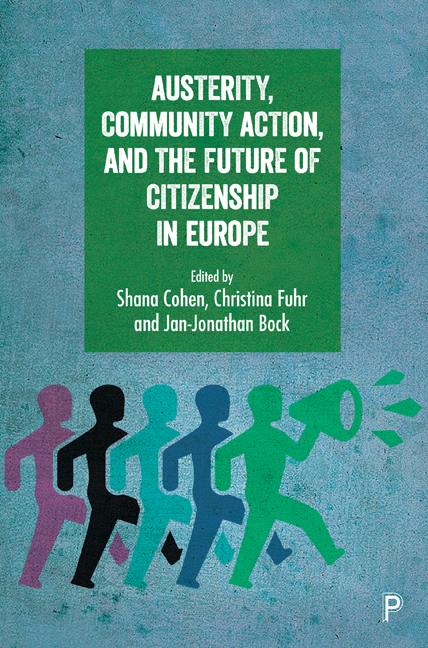Book contents
- Frontmatter
- Dedication
- Contents
- Acknowledgements
- Notes on contributors
- one Introduction: social activism, belonging and citizenship in a period of crisis
- Part I The social consequences of welfare policy
- Part II The practice of social good
- Part III Social change and neoliberalism
- Part IV Situating solidarity in perspective
- Index
one - Introduction: social activism, belonging and citizenship in a period of crisis
Published online by Cambridge University Press: 05 April 2022
- Frontmatter
- Dedication
- Contents
- Acknowledgements
- Notes on contributors
- one Introduction: social activism, belonging and citizenship in a period of crisis
- Part I The social consequences of welfare policy
- Part II The practice of social good
- Part III Social change and neoliberalism
- Part IV Situating solidarity in perspective
- Index
Summary
The repeated political and economic crises in Europe over the past few years – whether related to years of austerity imposed by national governments, the inflow of refugees, or the UK vote on membership of the European Union (EU) – have arguably intensified existing disaffection with political elites and confusion over the political and social meaning of citizenship. Is citizenship related to place of birth, to individual political behaviour, to shared values and personal or collective contributions to social solidarity, or a combination of all of these? How should public institutions and political rhetoric cultivate notions and practices of citizenship? More practically, how can politicians and policymakers promote a concept of citizenship and a related set of actions, such as civic engagement or political participation, when they are perceived as so distant from the majority of the population?
This volume brings together academics and practitioners in the UK and Germany who associate citizenship with the structural organisation and experience of social solidarity and likewise, going beyond distinctions often made in policy between individual behaviour and collective action. They are responding in their work to trends that have developed over past decades, namely the decline of trust in public institutions, rising economic insecurity and diminishing state intervention, to alleviate the effects of this insecurity. The most noticeable and negative consequences of the latter have been dramatic changes in welfare policies that limit eligibility and force more selfreliance, even among vulnerable populations facing complex and difficult circumstances, often involving health problems (Connor, 2010; Bonoli and Natali, 2012; Wiggan, 2012). The aim of the volume is to demonstrate how, in this era of economic and social pressure, academics analysing the potential transformation of society and individual identity, and social activists engaged directly with the destructive impact of welfare policy, are evoking a constructive alternative to more public expressions of disenchantment and disaffection. The choice of Germany and the UK is to illustrate the effects of the timing of austerity measures, or earlier in Germany, differences in welfare policies and political systems – namely regionalism in Germany and centralisation in the UK, and the role of civic and faith-based charities in addressing the demand and need generated by the decline in public benefits.
- Type
- Chapter
- Information
- Publisher: Bristol University PressPrint publication year: 2017

